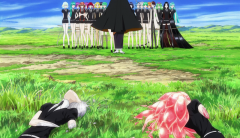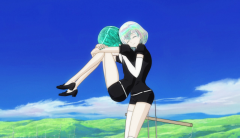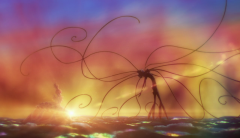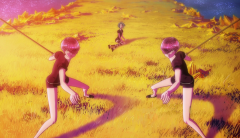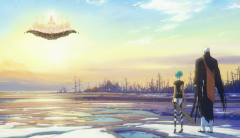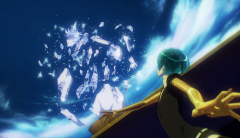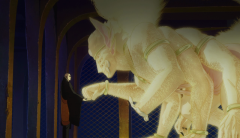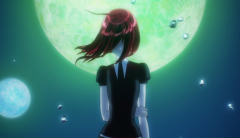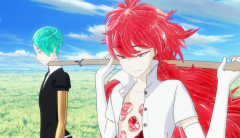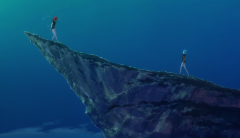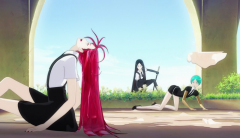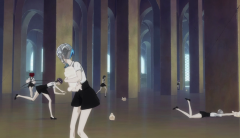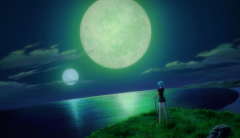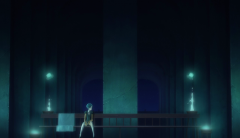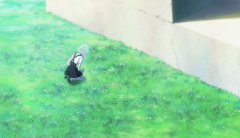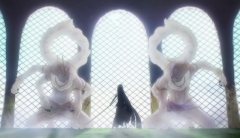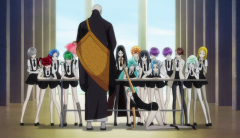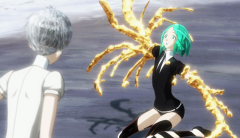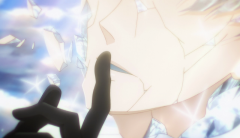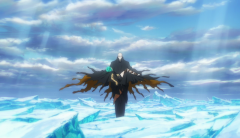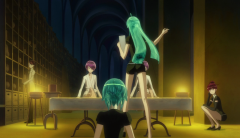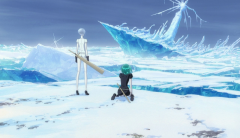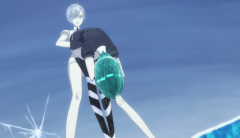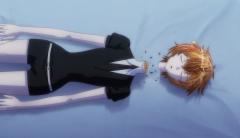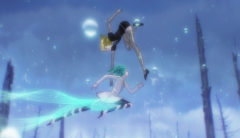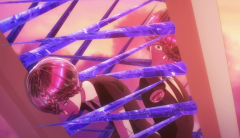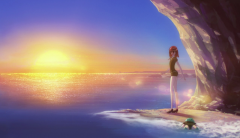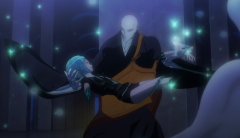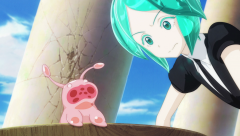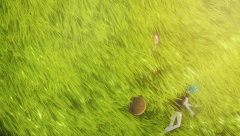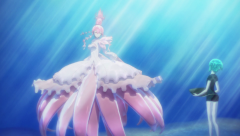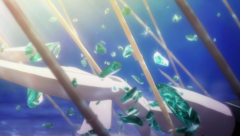Make no mistake, Houseki no Kuni is the most ambitious anime project of the year. Not only because it’s an entirely CG project (and make a damn good use of it, mind you), or because of its narrative scope that at once strange, grand and beauty, but also in its very conception in their production phase. Unlike normal anime products, Orange studio approached the material as early as nearly 2 full years before its initial broadcasting, and the production went through many unusual phases that took much longer time for the studio to complete. This is to say it was a rough path that they decided taking on and the result showcases how much confidence they adapt the material. This season feels much more as an introduction to an epic story and at its core Houseki serves as an coming of age story to our protagonist Phos, while exploring the insecurities of those gems towards their own roles. As I compare the manga and the anime adaptation together, I still regard the manga as a more astonishing version, but by all mean it’s not a criticism against the anime. Houseki the anime approaches the source in the best way it possibly can, both highlights the unique appeal of its gems cast, striking visual metaphoring and dynamic fights sequence that make it one of the best adaptation in my eyes: both respect the core themes that make the manga stands out, at the same time is vibrant with its own personality.
Houseki is a show of pure beauty. Its world building is ethereally fresh and rich, at once strange and full of mysteries yet to explore. Houseki features the world where the three races: the Lunarians who live over the Moon, the Gems who live in land and the Admirabilis who live under the sea. Underneath that surface where we follow the Gems doing their daily patrol and fight off the invaders Lunarians, the three races are hinted to be the three basic components that form the human race: the Soul, the Bone and the Flesh, respectively. Houseki is the work that is dense with Buddhism symbols, images and philosophy. This is further underlined in the way the character designs are drawn: the Moon People are identical entities, the Gems have their lower bodies almost the same, only the Gems-reflected in their hairs are vastly different and the Snails have their own distinctive, over-designed body with clear sexual traits. Speaking of the ambiguous of gender issues, Houseki might be the only series I could give a plus (+) rating for its sensitive approach to the non-gender beings, something that is rare even in today’s standard and something that speaks further to the originality of Houseki.
In order to approach the strange beauty of the Gems and the stylish dynamic of their fights, Houseki decided to go full CG – a decision that freaked out the manga fans considering the bad track of full CG shows. The computer generated might get some time to get used to, but the more Houseki displays its visual the more it reaches its new height. The characters look gorgeous in their CG models, the CG allows Houseki to experiment with many unusual shot angles and long shot tracking that really hard to pull in a traditional hand-drawn production. The sequence where Dia runs away from Shiro, for example, stands out for all the right seasons. In addition, this CG style uses its shortcomings in computer production (its lightweight movements and somewhat awkward character actings) into an asset, making the Gems feel offbeat and whimsical – the very quality that make them charming and pleasing to watch. The physical comedy, as a result, hits the mark most of the time. But not only the CG takes all the credits here, I have to praise the 2D production as well since the characters have 2D facial features that allow many subtle facial expressions. Orange studio really makes the most out of what they have, capturing the feeling of the manga using the tools of a different medium, and they pull off beautifully.
But exploring this mysterious world and its grand cast is only one of Houseki’s many concerns. This season is all about the growth of our main character, Phos, as they breaking apart, metamorphosing, and changing themselves for better or for worse. They experient some of the sharpest character development I have seen in awhile, both physically and psychologically. The more they losing parts of their body, the more useful and mature they become, the less memory they have. At the end of the day, what’s left of the original Phos? Phos certainly carries their own magnificently with their own charm and witty remarks and a natural voice acting from the talented Tomoyo Kurosawa. Moreover, Houseki underscores the identity and the insecurity of the Gems towards the own roles. Many of the gems, from Phos, Cinnabar, Dia are all struggling with their position. Those vulnerables make them so relatable and real. All other Gems of the cast have their own quirks, but they never sell themselves short. They share great natural chemistry to each other and each of them is memorable, grounded and overall a total joy to watch.
Aside from the colorful yet memorable characters, Houseki benefits from the stunning background arts that not only stand out on its own, but they fit to the narrative seamlessly. Take note how the color of the background changes according to the Gems in spotlight – a beautiful trick that both convey the aura of said character, but also is very appropriate to show the sparkling ability of those Gems. The anime visual has a lot of symmetric shots that from what I know isn’t apparent in the manga, but it’s a welcome upgrade since the techniques reflects very well the theme of Houseki. The soundtrack is another highlight that really elevate many sequences to another level, especially during the fight scenes.
But still, Houseki is much more than beautiful visuals. What I impress the most about Houseki is how they manage the overall tones of the show. Sometimes we have silly, offbeat fluffy comedy, at times it goes full on devastating that showcase a very realistic portrayal of grief; in other minutes Houseki is thrilling with monster chase, crazy Gems and dynamic fights. Strangely, all of these moments above feel really Houseki-y. It’s the show that is full of identity. Rarely I see an anime show that feel so unlike any other shows I watch out there, and manage to be so passionate on what it does, that I can let all my complaint about the show down under the kitchen sink. Unique, strange, beautiful, devastating, ambiguous, and charming all at once, Houseki is an one-of-a-kind series, and I mean it in the best possible way.

